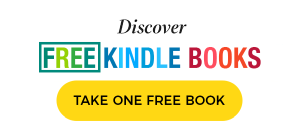Top 21+ Psychological Books on Controlling Emotions (2023)
Controlling your emotions is probably one of the most difficult things you could do in life. Indeed, different people do it differently. Some people are able to keep everything inside them, wait until they cool down and make more objective decisions.
Then, there are people who simply explode like volcanoes. Emotions come in all shapes and sizes. They can be positive or negative. Exploding positive emotions will not necessarily cause too much trouble, but the negative ones can become an issue.
What Are The Toughest Emotions to Deal With?
There are many tough emotions that people may experience at different points in their lives. I collected the most important ones:
- Grief · This is a complex emotion that arises from the loss of a loved one, a relationship, or a pet. It can manifest in many ways, including feelings of sadness, anger, guilt, and disbelief.
- Fear · Fear is a natural response to threats, both real and perceived. It can help us stay safe, but it can also hold us back from pursuing our goals and living our best lives.
- Anger · Anger is a powerful emotion that can arise in response to perceived injustices, mistreatment, or disrespect. It can be destructive if not managed appropriately, but it can also motivate us to take action and make positive changes.
- Shame · Shame is a painful emotion that arises when we feel unworthy or inadequate. It can be caused by past mistakes, negative self-talk, or societal expectations. Dealing with shame involves learning to accept and love ourselves for who we are, imperfections and all.
- Jealousy · Jealousy is a complex emotion that arises when we perceive someone else as having something we want or feel we deserve. It can be a powerful motivator or a destructive force in our lives, depending on how we choose to respond to it.
It's important to note, that some of the above mentioned emotions are very hard to identify and they could appear in a hidden level. Hence learning to understand and manage these emotions in healthy ways can help us live more fulfilling and meaningful lives.
No matter what kind of emotions you feel like you can’t control, here are a few interesting books that helped me feel more calculated. And by calculated, I mean objective, calm, and ready to observe a situation from the outside.
These books are not suitable for those who explode out of nowhere only. They're ideal for anyone who lets too many emotions out. They're excellent from a psychological point of view and will help you in life, work, and further interactions.
What Are The Best Books on Controlling Emotions?
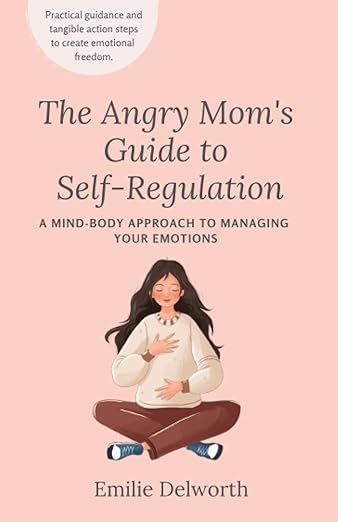
The Angry Mom's Guide to Self-Regulation, by Emilie Delworth (2023)
The Angry Mom's Guide to Self-Regulation is a self-help book that addresses the critical issue of emotional regulation among adults, particularly new mothers. The book underscores a pervasive issue that many adults lack the essential emotional regulation skills acquired during childhood, hindering their effectiveness in managing their emotions as parents.
This challenge is rooted in traditional parenting approaches that often encouraged children to suppress their emotions and disconnect from their bodies. Consequently, these individuals, despite their love and dedication as parents, struggle with dysregulated nervous systems, leading them into cycles of reactive behavior, guilt, and shame.

Big Feelings, by Liz Fosslien and Mollie West Duffy (2022)
Big Feelings is a relatable guide tackling tough emotions. The book is particularly relevant today, as many people struggle to talk about or manage their feelings in a society that often avoids discussing emotions.
Authors Liz Fosslien and Mollie West Duffy have built an online community where people share their experiences with issues like productivity guilt and pandemic anxiety. This book is a helpful resource for anyone feeling overwhelmed by emotions they can't predict or control, offering practical advice to understand and handle these feelings.
The book is organized into chapters, each focusing on a specific difficult emotion such as envy, burnout, or anxiety. The authors combine research and original illustrations to provide strategies for managing these emotions. Big Feelings reassures its readers that it's normal to experience tough emotions and that understanding them can lead to a deeper sense of self-awareness.
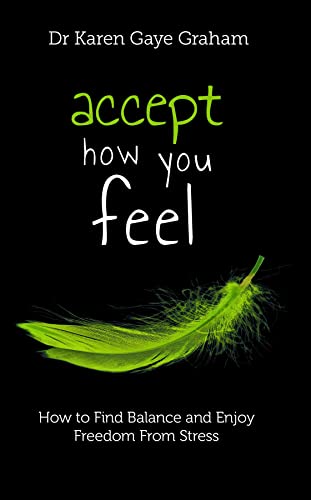
Accept How You Feel, by Dr. Karen Graham (2020)
This is one of the best books on controlling emotions I’ve ever read. Feelings are important instead, but how you manage them is even more important in the long run. The author offers a holistic philosophical approach that stands out.
You'll find out more about feelings and why some of them are more intense than others. You'll find out why you naturally want to block some feelings, not to mention becoming familiar with emotional awareness. Discover the feelings considered hard and how you can change everything for good.
I strongly believe this book is for everyone. And what truly matters is it teaches you how to give feelings a purpose. I mean, most of us enjoy or hate certain feelings. But we never channel them in the right direction, so we never take advantage of them.
Other than that, there are times when we feel like feelings are taking everything over. We’ve all been there. The more we know about them, the easier it is to respond to them.
Anyway, it’s hard to describe this book because it teaches you so many things. It’s one of the most detailed and straightforward controlling emotions books.

Parent Yourself Again, by Yong Kang Chan (2018)
This is one of the simplest, yet most effective books on controlling emotions you’ll ever read, trust me. And if you think about certain memories from your childhood, you’ll soon understand why.
When you’re young, you always get overwhelmed by emotions. Sometimes, it’s fear. Other times, it’s anger. There are all sorts of emotions that could give you a headache as an adult, too, not to mention as a child.
Now, the problem is many of these emotions will stick to us. If we don't handle them as kids, they'll grow up as traumas inside our bodies.
We're old now, and we can control certain things in life, but at the same time, these traumas may still kick in every now and then. The past can still sabotage us, indeed.
The problem is we don't know it, or even worse, we don't see it.
Regardless of whether you believe you have emotional baggage or not, I believe this book will still be beneficial for you. You’ll find something. We all do. It will help you love yourself and push your feelings in the right direction.

Rising Strong, by Brené Brown (2015)
We all get hurt at some point or another, part of life, part of the game… But how do you respond? Of course, we respond differently to different feelings. Some feelings can be suppressed. Others must be expressed out loudly.
Some of us can even push these feelings away.
Now, if you’re not the type to express your feelings, chances are they’ll start eating you on the inside. And you can probably admit that you feel like this quite often. This is when the book kicks in.
It's about falling emotionally, going back up, pushing even further, falling again, and so on.
There are a few good theories about how we numb our feelings, whether it's alcohol, food, or other addictions, maybe work or even shopping. The problem is we don't talk about them. Keeping all these things inside is unhealthy and will wear us out emotionally.
This 336 pages book will teach you to assess emotions in a constructive and useful manner, and it is definitely a must read.
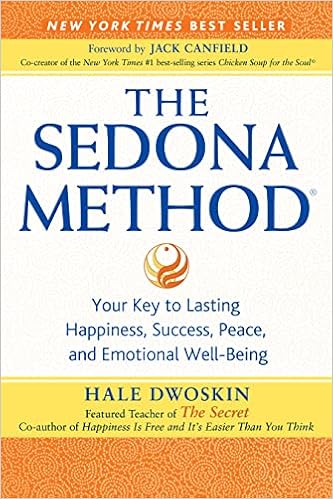
The Sedona Method, by Hale Dwoskin (2021)
If you struggle with intense emotions too often, this book is for you. I used to be like this back in the day. Sometimes, it’s a strong emotion. Other times, it’s a powerful thought or perhaps a belief. Well, these things can be quite intense and may prevent you from reaching your full potential.
If you’re looking for books on controlling emotions, this one stands out. It gives you a few objective questions to ask yourself, and no matter how intense your emotions are, it will help you calm down. More importantly, it will give you an objective point of view for better choices.
The method is incredibly simple. Anyone can do it, and that's what makes people feel skeptical about it. However, its benefits will kick in straight away.
The best part of implementing the ideas in the book is to try out the releasing technique on a daily basis. Sooner or later, it will become a habit, and you'll be able to get over your high pressure feelings with no issues whatsoever. It's all about training.
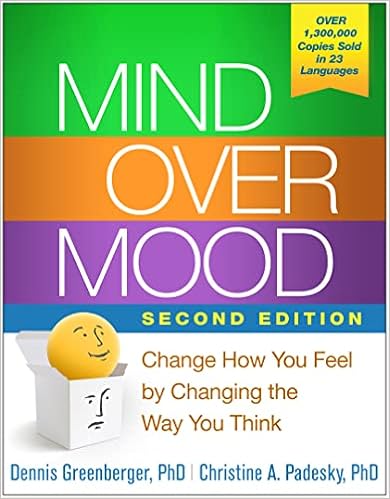
Mind Over Mood, by Dennis Greenberger and Christine A. Padesky (2015)
This book is a blockbuster, that’s probably what convinced me to give it a try, and I must say, I don't regret it.
The book is based on professional techniques and ideas of cognitive behavioral therapy. It’s based on things that therapists actually use when they talk to their clients.
It's not about random feelings but about coping with feelings that feel overwhelming, such as depression, worry, constant anxiety, shame, unneeded panic attacks, low self confidence, and much more. Even things related to one's personal relationships.
The book is very well structured, as it has more sections. Each of them will take you through one step at a time. You'll set goals first. Then, you'll watch the progress. You'll grade yourself, keep a journal, take some psychological exercises, and so on.
It’s a great tool with a very practical approach and one of the most helpful controlling emotions books you’ll ever read, trust me.

The Emotionally Sensitive Person, by Karyn Hall (2017)
Have you ever been told that you’re too sensitive? It doesn’t have to be a negative thing. Sometimes, it comes as an insult during an argument or a fight. Other times, one of your best friends or perhaps a family member tells you that you’re too sensitive.
Sometimes, it’s said with bad intentions. Other times, it’s all about asking you to be a bit more practical.
Now, this book is for people who are told that they’re too sensitive, as well as people who feel like that.
It's based on cognitive behavioral solutions, mindfulness ideas, and a more holistic approach. You'll learn how to identify different types of emotions, how to deal with them, find out what triggers them, and get ready before they even kick in.
This way, you'll be able to predict what's about to happen. You'll gain more confidence, and you'll be on top of the situation, simple as that.
If you feel overwhelmed by thoughts and emotions, this book is for you. While empathy is a good thing, being too empathic can make you feel weak. Again, this book is for you.
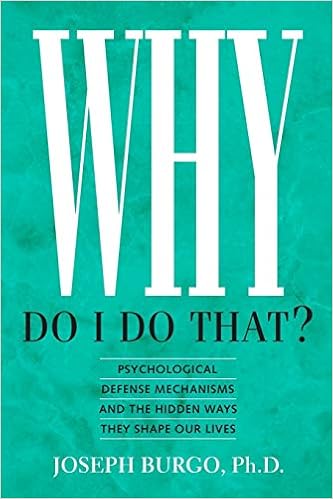
Why Do I Do That?, by Joseph Burgo Ph.D. (2016)
People react to emotions in different ways. Many of us will find a way to defend ourselves. It's a natural thing, it's not like we can plan it. It's a defense mechanism that triggers different situations, including emotional pain.
Well, this book assesses a few strategies on how to explore yourself, see yourself from the outside, and figure out what your defense mechanism is like.
It sounds complicated, I know, but the truth is anyone can understand the book. There’s no jargon language, no technical terms to confuse you. Everything is explained with the average individual in mind, rather than a professional.
You'll learn more about your unconscious mind, psychological defense mechanisms, and exercises to identify such things. But more importantly, you'll also learn how to create your own mechanisms, more efficient and actually useful.
Basically, if you feel like your emotions are difficult to control at times, this book will put you in charge of everything.
At the same time, if you feel like your defense mechanisms feel pervasive at times and can affect your relationship, this book will teach you how to make them more efficient.

Calming the Emotional Storm, by Sheri Van Dijk (2016)
Sheri Van Dijk has released one of the most detailed books on controlling emotions. The author based the book on dialectical behavior therapy, which is mostly used to treat borderline personality disorder.
There’s nothing to worry about, you don’t have to be a BPD patient to benefit from this book. However, it does help you train different techniques to control impulsive behaviors and volcanic explosions.
The skill is extraordinary in gaining control over your emotions, regardless of their type. Whether you experience a personal crisis every now and then or your emotions eat you on the inside, the skills you’ll develop with this book will save you from unnecessary emotional storms.
I know it sounds like a cliché, but that’s exactly what it does.

Healing Your Emotional Self, by Beverly Engel (2020)
According to experts, intense emotion is associated with an issue from the past, an unresolved one. For example, those with difficult childhoods may experience intense feelings as grownups. The same rule applies to those who’ve been abused in the past.
Even if you don’t realize it, some traumas can still be in there. It’s not all obvious, but intense emotions can indicate a problem from the past. If you have such feelings, this book will help out.
It’s one of the most helpful controlling emotions books because its main role is to heal soul wounds. It’s incredibly practical too. You’ll love the exercises and tools introduced in it.
Don’t get me wrong, it’s not a good resource if you need professional help or if you require an actual doctor, but it’s definitely a great introduction in these cases. And if it’s not that severe, you can definitely start rebuilding your confidence with the practical advice in it.
I believe Beverly Engel’s book can help even if you don’t realize you might have a trauma. If you simply think your emotions are too deep or intense, I believe you should give it a read. It will definitely calm you down and give you a healthier approach to your feelings.

Don’t Let Your Emotions Run Your Life, by Scott E. Spradlin (2012)
This release discusses dialectical behavior therapy, what it is, how it works, and how you can use it to be in charge of your emotions and feelings.
It's got plenty of step by step instructions, exercises, and ideas to start implementing today. You'll soon be able to understand what each feeling means and what kind of reactions it triggers. Later on, you'll discover some strategies to regulate emotions and cope with such situations.
Most issues arise with painful emotions, rather than positive ones. Figuring them out will help you adopt a more acceptable behavior.
This book is ideal for those who are highly reactive from an emotional point of view.
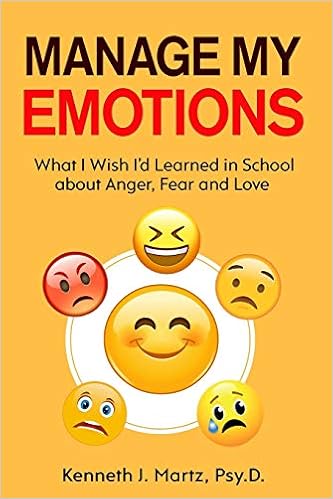
Manage My Emotions, by Kenneth Martz (2020)
Suffixed by ‘What I Wish I'd Learned in School about Anger, Fear and Love,’ this book is dedicated to emotions. It is for those who want to come out of the emotional frustration due to restricted success as well as need a deeper comprehension of how emotions help in life. If emotions are limiting your success, this book tells you how to come out of it.
For this, it helps in analyzing a variety of emotions, ranging right from fear to love and compassion so that the reader can find out how they can motivate or disrupt us. There are diverse strategies in the book that help deal with the latter part.
The book provides simple scenarios or examples for revealing solutions for common concerns related to relationships, culture, communication, job, and substance use. With weightage to dealing with emotions, the aim is to strike a balance across the different emotions.
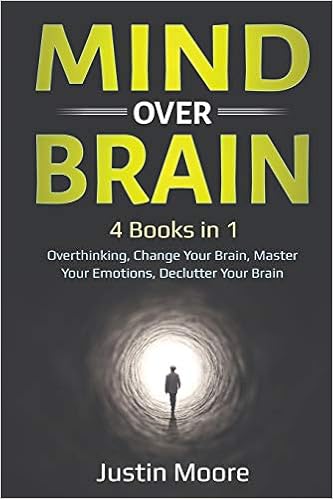
Mind over Brain, by Justin Moore (2020)
This is a set of four books namely, Overthinking, Master Your Emotions, Change Your Brain, and Declutter Your Brain. You get a lot of material for changing your attitude for better mental as well as emotional health.
The Overthinking book shows you how to get rid of fear by staying in the present. It aims to prove that you are not the slave of your thoughts. The Master Your Emotions book helps in developing self-awareness, emotional intelligence (EQ), intentional living, and mindfulness. Even this one proves how you can stop being governed by your emotions and take them positively.
The Change Your Brain book helps in retraining your brain for motivation, courage, and good habits; while the Declutter Your Brain book helps to make your mind clean and organize your life.

Master Your Emotions, by Jon Power (2020)
Dealing with emotions is not a skill or an art that we are born with. It takes time to comprehend them before tackling them effectively. It becomes tough to handle emotions in a stressful situation.
At the same time, it also becomes challenging to handle others’ feelings. It is vital to know a workaround or skills to handle these emotions. This is exactly what you will get from Master Your Emotions.
It is for those who are searching for a practical way to increase their overall understanding of their own and others’ feelings. It is a self-help guide on overcoming negativity and anxiety, stopping procrastination, and improving social skills with motivational techniques.

Permission to Feel, by Marc Brackett (2019)
As a professor of a university, Marc Brackett has recognized that the astonishingly poor mental health of kids and luckily knows what to do. The latter part is what Permission to Feel exactly reveals.
As an emotion scientist, he has come with a highly effective plan to restore their lives to the original. It is in the form of a blueprint for comprehending emotions and utilizing them such that they help us to be successful.
His approach to imparting emotional intelligence is named RULER, which is an acronym representing the five important skills. R means Recognizing emotions, U means Understanding their causes and outcomes, L stands for Labeling emotions, E means Expressing emotions, and R stands for Regulating emotions such that they help in accomplishing goals. Sounds interesting, right?

The Buddha and the Badass, by Vishen Lakhiani (2020)
Based on the author’s former book, ‘The Code of the Extraordinary Mind,' The Buddha and the Badass shall uproot your deep beliefs (negative) about life, success, and work. Vishen, the author, has made his life and company his experimental, spiritual lab to decrypt everything to lead life and work.
The book aims at removing the modern belief that hustle and hard work are required for success. Rather, it tells you to awaken the Buddha and the Badass in you. The Buddha is the prototype of a spiritual master who lives but also moves with grace with inner awareness.
The Badass is the prototype of a change maker, a kind disruptor challenging the norms for being better humans. As you incorporate the skill sets of both, the entire living experience changes. Most of us will then start living with bliss, ease, insight, and abundance.
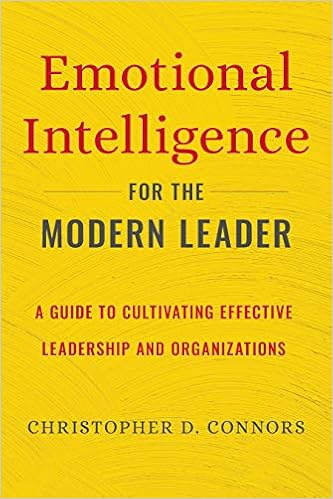
Emotional Intelligence for the Modern Leader, by Christopher D. Connors (2020)
This is a guide to sharpen your emotional intelligence for inspiring, motivating, and understanding people around you who make you the leader in your organization. With it, you obtain many keys to business success by developing effective leadership skills by mastering emotional intelligence.
This intelligence is nothing but the ability to remain aware of, express, and control your emotions while dealing with interpersonal relationships compassionately during your leadership regime. Based on proven research, this book educates you about the foundation and aspects of high-EQ leadership.
The book has practical and simple exercises that you can use to develop self-awareness and empathy. You will also get familiar with some emotionally intelligent leaders and how they were successful.
Apart from knowing how to lead with top EQ and make it an integral part of your organization, the book also helps you find out your leadership style and its impact on the surrounding people.

Detox Your Thoughts, by Andrea Bonior (2020)
This book is dedicated to analyzing negative emotions. As an esteemed clinical psychologist, Andrea Bonior has revealed the most common mental traps that increase anxiety and insecurity. For each of the traps, you get a novel habit to practice!
Andrea has spent several years in studying, practicing, and imparting the science of thoughts and emotions. In this book, the author reflects the latest research done for Cognitive Behavioral Therapy (CBT), Acceptance and Commitment Therapy (ACT), and mindfulness. It shows how to come out of the negative self-talk by changing your way of relating thoughts.
Andrea also decrypts the latest studies done in the field of neuroscience and psychology to conquer self-sabotaging thoughts with practical steps. By learning the tips of this book, you do not eradicate negative thoughts and emotions, but you learn to grow bigger than them and improve your emotional as well as mental life.
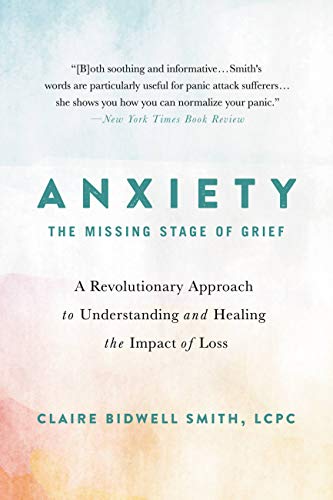
Anxiety: The Missing Stage of Grief, by Claire Bidwell Smith (2018)
Do not allow the grief or anxious feelings to ruin your life; rather, make them your empathetic tools! This is what this book is all about! It is a revolutionary guide that builds the little-known yet important relationship between grief and anxiety and provides realistic healing strategies that go along the famous Kübler-Ross stages model.
A considerable loss and unsettled grief are the main foundations of anxiety, which is something that the author recognized while handling her therapy clients. With the help of real stories and research, the author defines both the emotions and suggests taking effective approaches such as retraining the brain and making changes.
By using real tools and managing strategies for anxious thoughts and panic attacks, the author builds the gap between these two emotions in a practical and empathetic manner.

If there's anything I can do, by Caroline Voaden (2020)
This is a practical guide for those who want to make the life easier of a beloved one who is undergoing the pain of bereavement. Should I call but do not talk of the one who has died, should I leave them alone, or should I send flowers; such are the thoughts in your mind for helping that person. It means you feel unsure of how to help, which is normal.
To make their life easier although you cannot take their grief, the author who has passed through the pain of bereaved has written this book. After becoming a widow with two kids in 2003, Caroline has shared her experience of coping up after her partner’s death.

Empath Healing, by Marc Goossens (2020)
This is a healing guide for the empaths who can then easily defend themselves from the negative and energies and toxic traits. It is an insightful book for those who feel overwhelmed by others’ emotions of others or are the victims of emotional or narcissistic abuse.
The author describes why you work in a specific way and how to heal yourself and others without any negativity or overwhelming experience. You will easily find answers to what empathy is, how to know if you are someone else is an empath, what are the myths and misconceptions about empaths, how to handle narcissistic and emotional abuse, and how to locate emotional and energy vampires from a distance to keep them away.
Conclusion
I believe these books on controlling emotions will help you keep your feelings under control in a more efficient manner. I find it hard to tell which one is the best because what works for me won’t work for everyone else.
But even if some of these books on emotions won’t work, a bit of education on the topic will definitely help out in the future.
Check out also our favorite self-help books to find your real self.
My profession is online marketing and development (10+ years experience), check my latest mobile app called Upcoming or my Chrome extensions for ChatGPT. But my real passion is reading books both fiction and non-fiction. I have several favorite authors like James Redfield or Daniel Keyes. If I read a book I always want to find the best part of it, every book has its unique value.






